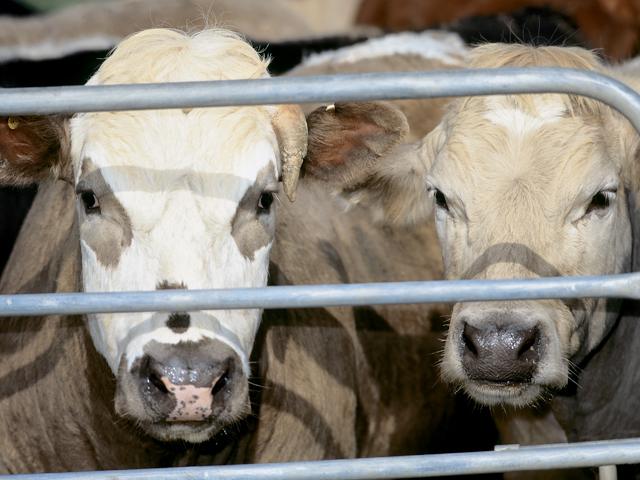Feedlot Discharged Manure Into River
No Permit for Manure Discharge Could Cost Feedlot $120 Million in Fines
LINCOLN, Neb. (DTN) -- An environmental group is trying to stop an Idaho feedlot from discharging manure and other waste into the Snake River as it has without a federal discharge permit since 2012.
The group Snake River Waterkeeper filed a Clean Water Act lawsuit in the U.S. District Court for the District of Idaho in Boise on Tuesday against J.R. Simplot Company and Simplot Livestock Company. The group alleges the pollution discharges continue to the present day from the company's 150,000-head feedlot near Grand View, Idaho, in the Snake River Canyon.
The lawsuit said the Grand View feedlot meets the requirements of a pollution point source in the CWA, meaning it is required to have a National Pollution Discharge Elimination System (NPDES) permit. Such discharges are allowed with NPDES permits.
J.R. Simplot did not respond to DTN's request for comment.
"The middle Snake River in southern Idaho has been abused by industrialized agriculture for decades," the lawsuit said. "Defendants have failed and continue to fail to properly manage manure at the Grand View Feedlot. Among other problems, defendants are unable to control rain and snowmelt that flows onto the feedlot, defendants overapply manure to nearby fields, and defendants fail to otherwise adequately collect, contain and dispose of manure. As a result, manure and manure-laden water from the Grand View feedlot course through streams, canals and ditches and flow into the nearby Snake River.
"Defendants previously had a Clean Water Act permit but they let it expire in 2012 and never sought a new permit."
According to the complaint, the feedlot was issued an NPDES permit that became effective on April 3, 1997. That permit was administratively extended on Jan. 7, 2002.
P[L1] D[0x0] M[300x250] OOP[F] ADUNIT[] T[]
On Dec. 18, 2012, the EPA informed J.R. Simplot that because it had not timely submitted a new notice of intent and a nutrient management plan to receive coverage under the EPA Region 10's NPDES general permit, "any discharges from the Grand View feedlot would be unauthorized and would fail to comply with Section 301 of the Clean Water Act," the lawsuit said.
"Defendants never subsequently obtained an NPDES nor IPDES (Idaho Pollution Discharge Elimination System) permit for the Grand View feedlot."
The lawsuit calls for the court to require J.R. Simplot to pay fines for each day it discharged pollution without a permit. According to the complaint, that adds up to five years and 60 days -- or as high as $121.8 million.
The environmental group also asks the court to require J.R. Simplot to remediate any damage caused by non-compliance.
The lawsuit outlines where feedlot waste is accumulated and how it is moving to the Snake River.
"Precipitation that runs onto the Grand View feedlot mingles with and becomes contaminated by large quantities of animal waste, feed, sediment, and other pollutants," the lawsuit said.
"Based on aerial and satellite imagery, and defendants' own admissions as discussed below, defendants have not installed diversion structures, adequate wastewater containment structures, or alternative conservation measures such as wastewater treatment facilities to control and detain all precipitation falling on the Grand View feedlot site and any related stormwater entering the site. The contaminated water then discharges to the Snake River via tributaries such as the Middle Line Canal, Low Line Canal, Jack Creek, Corder Creek and other tributaries and conduits."
According to a news release from Snake River Waterkeeper, the feedlot houses up to at least 65,000 cattle that generate at least 47,450 tons of manure each year.
During a six-year period, the environmental group said it conducted water quality sampling in the Snake River at the Ted Trueblood Wildlife Management Area and other locations near the feedlot.
"For decades, J.R. Simplot's Grand View feedlot has used the Snake River as a sewer system to move manure downstream, externalizing catastrophic bacterial pollution to downstream communities and aquatic life," said Buck Ryan, Snake River Waterkeeper's executive director.
"It is time Idaho stopped offering zero accountability to the nation's biggest corporate polluters."
The Idaho Department of Environmental Quality classifies the stretch of the middle Snake River near the feedlot as impaired for failing to meet water quality standards.
Todd Neeley can be reached at todd.neeley@dtn.com
Follow him on Twitter @DTNeeley
(c) Copyright 2023 DTN, LLC. All rights reserved.






